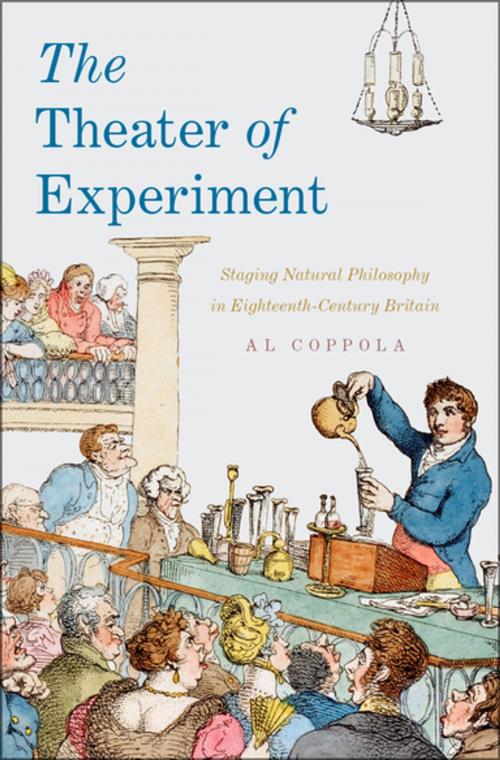The Theater of Experiment
Staging Natural Philosophy in Eighteenth-Century Britain
Fiction & Literature, Literary Theory & Criticism, Drama History & Criticism, Nonfiction, History, British| Author: | Al Coppola | ISBN: | 9780190627263 |
| Publisher: | Oxford University Press | Publication: | August 19, 2016 |
| Imprint: | Oxford University Press | Language: | English |
| Author: | Al Coppola |
| ISBN: | 9780190627263 |
| Publisher: | Oxford University Press |
| Publication: | August 19, 2016 |
| Imprint: | Oxford University Press |
| Language: | English |
The first book-length study of the relationship between science and theater during the long eighteenth century in Britain, The Theater of Experiment explores the crucial role of spectacle in the establishment of modern science by analyzing how eighteenth-century science was "staged" in a double sense. On the one hand, this study analyzes science in performance: the way that science and scientists were made a public spectacle in comedies, farces, and pantomimes for purposes that could range from the satiric to the pedagogic to the hagiographic. But this book also considers the way in which these plays laid bare science as performance: that is, the way that eighteenth-century science was itself a kind of performing art, subject to regimes of stagecraft that traversed the laboratory, the lecture hall, the anatomy theater, and the public stage. Not only did the representation of natural philosophy in eighteenth-century plays like Thomas Shadwell's Virtuoso, Aphra Behn's The Emperor of the Moon, Susanna Centlivre's The Basset Table, and John Rich's Necromancer, or Harelequin Doctor Faustus, influence contemporary debates over the role that experimental science was to play public life, the theater shaped the very form that science itself was to take. By disciplining, and ultimately helping to legitimate, experimental philosophy, the eighteenth-century stage helped to naturalize an epistemology based on self-evident, decontextualized facts that might speak for themselves. In this, the stage and the lab jointly fostered an Enlightenment culture of spectacle that transformed the conditions necessary for the production and dissemination of scientific knowledge. Precisely because Enlightenment public science initiatives, taking their cue from the public stages, came to embrace the stagecraft and spectacle that Restoration natural philosophy sought to repress from the scene of experimental knowledge production, eighteenth-century science organized itself around not the sober, masculine "modest witness" of experiment but the sentimental, feminized, eager observer of scientific performance.
The first book-length study of the relationship between science and theater during the long eighteenth century in Britain, The Theater of Experiment explores the crucial role of spectacle in the establishment of modern science by analyzing how eighteenth-century science was "staged" in a double sense. On the one hand, this study analyzes science in performance: the way that science and scientists were made a public spectacle in comedies, farces, and pantomimes for purposes that could range from the satiric to the pedagogic to the hagiographic. But this book also considers the way in which these plays laid bare science as performance: that is, the way that eighteenth-century science was itself a kind of performing art, subject to regimes of stagecraft that traversed the laboratory, the lecture hall, the anatomy theater, and the public stage. Not only did the representation of natural philosophy in eighteenth-century plays like Thomas Shadwell's Virtuoso, Aphra Behn's The Emperor of the Moon, Susanna Centlivre's The Basset Table, and John Rich's Necromancer, or Harelequin Doctor Faustus, influence contemporary debates over the role that experimental science was to play public life, the theater shaped the very form that science itself was to take. By disciplining, and ultimately helping to legitimate, experimental philosophy, the eighteenth-century stage helped to naturalize an epistemology based on self-evident, decontextualized facts that might speak for themselves. In this, the stage and the lab jointly fostered an Enlightenment culture of spectacle that transformed the conditions necessary for the production and dissemination of scientific knowledge. Precisely because Enlightenment public science initiatives, taking their cue from the public stages, came to embrace the stagecraft and spectacle that Restoration natural philosophy sought to repress from the scene of experimental knowledge production, eighteenth-century science organized itself around not the sober, masculine "modest witness" of experiment but the sentimental, feminized, eager observer of scientific performance.















